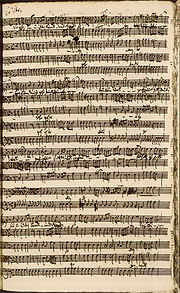
Kapitänsmusik
Encyclopedia

Georg Philipp Telemann
Georg Philipp Telemann was a German Baroque composer and multi-instrumentalist. Almost completely self-taught in music, he became a composer against his family's wishes. After studying in Magdeburg, Zellerfeld, and Hildesheim, Telemann entered the University of Leipzig to study law, but eventually...
. They comprise sacred
Religious music
Religious music is music performed or composed for religious use or through religious influence.A lot of music has been composed to complement religion, and many composers have derived inspiration from their own religion. Many forms of traditional music have been adapted to fit religions'...
oratorio
Oratorio
An oratorio is a large musical composition including an orchestra, a choir, and soloists. Like an opera, an oratorio includes the use of a choir, soloists, an ensemble, various distinguishable characters, and arias...
s and secular serenade
Serenade
In music, a serenade is a musical composition, and/or performance, in someone's honor. Serenades are typically calm, light music.The word Serenade is derived from the Italian word sereno, which means calm....
s. However, the oratorios were intended to be performed in a secular setting, the Hamburg Drillhaus, and their characters are almost exclusively allegorical. The Kapitänsmusik was written for the annual banquet (or convivium) of the Hamburg
Hamburg
-History:The first historic name for the city was, according to Claudius Ptolemy's reports, Treva.But the city takes its modern name, Hamburg, from the first permanent building on the site, a castle whose construction was ordered by the Emperor Charlemagne in AD 808...
militia
Militia
The term militia is commonly used today to refer to a military force composed of ordinary citizens to provide defense, emergency law enforcement, or paramilitary service, in times of emergency without being paid a regular salary or committed to a fixed term of service. It is a polyseme with...
captains – one oratorio and one serenade for each banquet. The works span the period from 1723 to 1766, although many of the manuscripts have now been lost, and in several of those years no banquet was held. Although Telemann's grandson Georg Michael Telemann inherited many autographs and manuscript copies of Telemann's vocal works, the rest of his musical estate, including the Kapitänsmusik, was sold at an auction in Hamburg on September 6, 1769. Much of that material has since disappeared, and the auction catalogue has not survived. Of the 36 Kapitänsmusiken that Telemann wrote, only 10 oratorios (with nine complete oratorio–serenade pairs) plus a few separate pieces are extant today.
Kapitänsmusik timeline
- 1723: Missing / Lost
- 1724: Oratorio + Serenata extant in Schwerin, Mecklenburgische Landesbibliothek Mus.ms. 5377/5 (Parts)
- 1725: Missing / Lost
- 1726: Missing / Lost
- 1727: Missing / Lost
- 1728: Only Oratorio: Berlin, SPK, Mus. ms. autogr. G. Ph. Telemann 28 (Score)
- 1729: Missing / Lost
- 1730: Oratorio + Serenata in SPK Mus. ms. autogr. G. Ph. Telemann 22 (Score)
- 1731: Missing / Lost
- 1732: Missing / Lost
- 1733: Missing / Lost
- 1734: Missing / Lost
- 1735: Missing / Lost
- 1736: Oratorio + Serenata in Schwerin Mus. ms. 5377/4 (Parts)
- 1737: Missing / Lost
- 1738: Oratorio + Serenata in Schwerin Mus. ms. 5377/3 (Parts)
- 1739: Missing / Lost
- 1740: Missing / Lost
- 1741: There was no Convivium
- 1742: Oratorio + Serenata in Schwerin Mus. ms. 5377/6 (Parts)
- 1743: Missing / Lost
- 1744: SPK Mus. ms. 21760 + 21761 (Parts), Mus. ms. autogr. G. Ph. Telemann 134 (autograph Violoncell-Part of O. + S.)
- 1745: There was no Convivium
- 1746: Missing / Lost
- 1747: Missing / Lost
- 1748: Missing / Lost
- 1749: Missing / Lost
- 1750: There was no Convivium (due to the burning down of St. Michaelis church)
- 1751: Missing / Lost
- 1752: Missing / Lost
- 1753: Missing / Lost
- 1754: Missing / Lost
- 1755: Oratorio + Serenata in SPK Mus. ms. autogr. G. Ph. Telemann 9 (Score)
- 1756: Only fragment of the oratorio in SPK Mus. ms. 21755 (Parts)
- 1757: There was no Convivium (due to the Seven-years-war)
- 1758: like 1757
- 1759: Missing / Lost
- 1760: Oratorio + Serenata in SPK Mus. ms. autogr. G. Ph. Telemann 23 (Score), autogr. 134 (Fragments of wind instr.); SPK 21743/45 + 21755/10 /Parts without wind instr.)
- 1761: Fragments of Oratorio in SPK 21755/14
- 1762: There was no Convivium
- 1763: There was no Convivium
- 1764: Oratorio in SPK 21755/18, Serenata in SPK 21755/19
- 1765: Missing / Lost
- 1766: There was no Convivium

